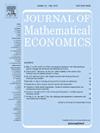等级制度中的公平分配:边际主义与平均主义之间的妥协
IF 0.7
4区 经济学
Q3 ECONOMICS
引用次数: 0
摘要
本文探讨了等级制社会结构中个人之间经济盈余的公平分配,结合了边际主义和平等主义的看似矛盾的原则。我们将这种情况形式化为带有许可结构的合作博弈,并引入了一类新的分配规则,称为平等主义许可值,扩展了传统的平等主义Shapley值。我们的主要贡献在于通过单调性公理为这类规则建立了一个公理基础。此外,我们为权限值提供了一个基于单调性的基础,作为一种特殊情况。我们的研究结果还表明,在存在层次结构的情况下,与文献中的传统发现相比,单靠单调性特性不足以证明采用线性分配规则是合理的。本文章由计算机程序翻译,如有差异,请以英文原文为准。
Fair allocation in hierarchies: A compromise between marginalism and egalitarianism
This paper explores the fair allocation of economic surplus among individuals within hierarchical social structures, incorporating the seemingly conflicting principles of marginalism and egalitarianism. We formalize this situation as cooperative games with permission structures and introduce a novel class of allocation rules called egalitarian permission values, extending the traditional egalitarian Shapley values. Our main contribution lies in establishing an axiomatic foundation for this class of rules through a monotonicity axiom. Additionally, we provide a monotonicity-based foundation for the permission value as a special case. Our results also reveal that, in the presence of hierarchical structures, a monotonicity property alone is insufficient to justify the adoption of linear allocation rules, contrasting with the conventional findings in the literature.
求助全文
通过发布文献求助,成功后即可免费获取论文全文。
去求助
来源期刊

Journal of Mathematical Economics
管理科学-数学跨学科应用
CiteScore
1.70
自引率
7.70%
发文量
73
审稿时长
12.5 weeks
期刊介绍:
The primary objective of the Journal is to provide a forum for work in economic theory which expresses economic ideas using formal mathematical reasoning. For work to add to this primary objective, it is not sufficient that the mathematical reasoning be new and correct. The work must have real economic content. The economic ideas must be interesting and important. These ideas may pertain to any field of economics or any school of economic thought.
 求助内容:
求助内容: 应助结果提醒方式:
应助结果提醒方式:


